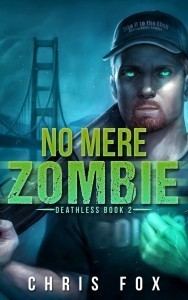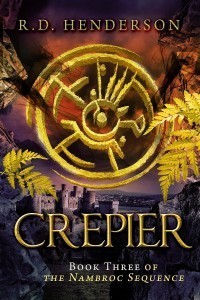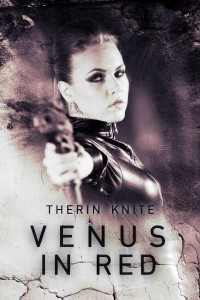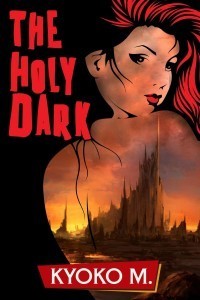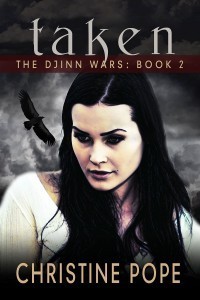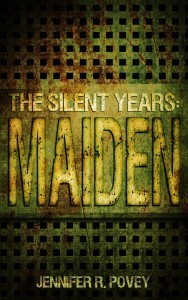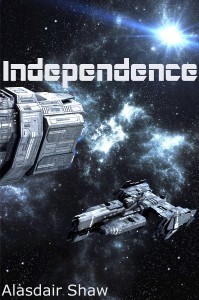Cora Buhlert's Blog, page 107
May 7, 2015
Arson, attempted murder and the destruction of a 150 year old department store
Yesterday evening, I was at the monthly translators’ meet-up at a restaurant in Bremen city centre.
At around a quarter to ten, I was driving home along an elevated road through the city centre and noticed a dark cloud drifting over the roofs of the office buildings lining the road. At first, I thought it was just weird weather again – we’d been having thunderstorms and heavy showers earlier in the day. But then I realised that the dark cloud was not a cloud at all, but smoke. A column of black smoke.
“Do you see that?”, I asked the friend who’d picked me up, “That’s smoke. There must be a fire over there.”
We took another look and listened for fire engine sirens, but there was nothing, just the column of smoke.
Once home, I switched on the radio news and heard that Harms am Wall, an upscale department store, was on fire and that the blaze threatened neighbouring houses as well. The fire was reported at around a quarter to ten, i.e. around the time we drove past the site at a distance of approx. 200 meter. Google Maps shows the location. The yellow line is the elevated road, the red dot the store.
I was quite horrified by the news, because Harms am Wall has been something of a Bremen institution for 150 years now, an upscale department store specialising in fashion, lingerie and household goods. Everybody who’s been living in Bremen for any significant amount of time has probably been inside Harms at some point, even if they weren’t regular customers. I still have a pullover I bought there many years ago. My Mom had her wedding register there back in 1965. There are some historical photos of the store here.
Harms was one of the last remaining traditional stores in Bremen, one of the last of a breed of independent retailers that have been serving the people of Bremen for decades, if not centuries. When I was a kid, there were still a lot of these traditional stores around, mostly clothing retailers, but also shoe and underwear shops, furniture stores, shops selling china and household goods, toy stores, book stores, stationery shops, perfumeries, cafés. They gradually vanished from the late 1980s onwards, often unnoticed and unremarked, their vacated premises taken over by chain stores, the same chain stores you can find in every other shopping precinct in the centre of every other German city. And those that remained were often much diminished from what they had once been.
Thinking back, I’m shocked how many stores that were fixtures of Bremen city centre, when I was a kid, have vanished in the meantime. And since photos from the 1970s and 1980s are so very hard to come by (it’s all either pre-WWII or modern – here is a rare photo of Obernstraße, Bremen’s main shopping street, from the 1980s, showing a lot of long gone shops*), many of them have left no trace behind at all. Often, I can’t even tell you when or how they vanished, because unless it was a store where either I or my parents regularly shopped, I didn’t notice. Because these stores were traditional and long established, a lot of them catered to older customers and they were often pricier than the chains that replaced them. Often, they were too pricy for me.
Until last night, Harms am Wall was one of the few holdouts from that era, one of the few independent stores left in a world of chains. That alone would make its loss a tragedy. But it gets worse.
I’d heard that the Harms store, housed in a building dating from 1911, was being refurbished in preparation for the 150th anniversary celebrations.
What few people knew was that the Harms owners were involved in a protracted legal battle with their landlord, the owner of the 1911 building, over rents and long overdue repairs and renovations. Basically, the owner wanted Harms out, because they felt the store wasn’t paying enough rent for retail premises in an upscale neighbourhood, completely ignoring the fact that Harms was a large part of the reason why the street Am Wall is considered an upscale shopping area at all, since most of the other upscale shops there such as a whole bunch of exclusive porcelain shops have long since gone. And the last remaining porcelain shop was damaged last night by the fire next door.
The case went to court and Harms won. Renovation work was started and Harms got their rent reduced in the meantime. And then the fire happened. This video from the local news program buten un binnen has more.
But again it gets worse. Because not just was the fire likely caused by arson, it was also very probably a murder attempt. Because it turned out that the Harms manager was mugged, robbed and then locked in a room in the store. By the time, he was able to free himself, the store was already on fire. However, he managed to rescue the CCTV recordings before the fire could claim them.
This wasn’t the first fire at Harms BTW. In 2013, a small fire broke out in a display window. No one was harmed, but a lot of merchandise was damaged.
*Depressingly, most photos of Bremen from the 1970s and 1980s seem to have been taken by trainspotters and focus on trams.
 Send to Kindle
Send to Kindle
April 29, 2015
Indie Speculative Fiction of the Month for April 2015
 It’s that time of the month again, time for “Indie Speculative Fiction of the Month”.
It’s that time of the month again, time for “Indie Speculative Fiction of the Month”.
So what is “Indie Speculative Fiction of the Month”? It’s a round-up of speculative fiction by indie authors newly published this month, though some March books I missed the last time around snuck in as well. The books are arranged in alphabetical order by author. So far, most links only go to Amazon.com, though I may add other retailers for future editions.
Once again, we have new releases covering the whole broad spectrum of speculative fiction. We have science fiction, space opera, military SF, paranormal romance, utopian fiction, dystopian fiction, post-apocalyptic fiction, epic fantasy, urban fantasy, time travel, weird western, Steampunk, Cyberpunk, horror, dragons, djinns, zombies, sarcastic demon hunters, teenaged half-demons, quirky inns, telepathic assassins, trolls, fairy queens and much more.
Don’t forget that Indie Speculative Fiction of the Month is also crossposted to the Speculative Fiction Showcase, a group blog run by Jessica Rydill and myself, which features new release spotlights, guest posts, interviews and link round-ups regarding all things speculative fiction several times per week.
As always, I know the authors at least vaguely, but I haven’t read all of the books, so Caveat emptor.
And now on to the books without further ado:
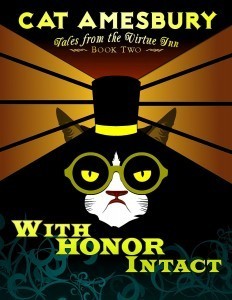 With Honor Intact by Cat Amesbury
With Honor Intact by Cat Amesbury
When the Cat’s away…
Honor Desry hadn’t applied to be the Innkeeper of a sentient Inn with magical guests, but her sisters and her right-hand fox-man are making the job a lot sweeter. Unfortunately, the supreme Cat God has disappeared on Honor’s watch, and Honor’s old life is about to interfere with her new life in a major way.
The Naked Glassblowers Association has booked a holiday vacation at the Virtue Inn, and Honor’s old boss and his partner are coming along to chaperone. Honor needs to find the Cat, keep the strange guests away from the supernatural guests, and somehow hold family and mind together.
But the Virtue Inn hasn’t revealed all of its secrets and Honor will need to summon every last piece of her courage and cunning to save the day With Honor Intact.
Warning: Contains violence, profanity, innuendo, and homicidal cardigans.
This is the sequel to The Guests of Honor.
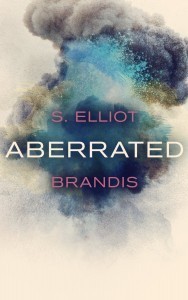 Aberrated by S. Elliot Brandis
Aberrated by S. Elliot Brandis
IRRADIATED told the story of Jade and Pearl, sisters fighting for their lives in an harsh and twisted wasteland.
DEGENERATED delved into the tunnels–a twisted underground society, at odds with the outside world.
ABERRATED is the epic conclusion.
Humanity is on its last legs. Only outlaws and outcasts remain. They are mutants, mongrels, and orphans. They are experiments, degenerates, and visionaries. Every last one is aberrated.
Will they tear each other apart? Or will humanity find a way to survive?
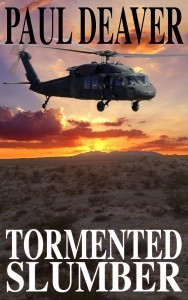 Tormented Slumber by Paul Deaver
Tormented Slumber by Paul Deaver
War doesn’t always end after the last shot is fired. Returning home begins a whole new battle.
A veteran discovers that demons followed him home from the battlefield and threaten to destroy his life. The soldier regains hope when he finds unexpected allies to confront his worst nightmares.
3,000 word short story.
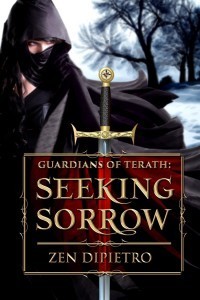 Seeking Sorrow by Zen DiPietro
Seeking Sorrow by Zen DiPietro
An earth-like world of high-tech humans faces the reality that their world is not as safe as they thought it was. Five people are thrown together to quietly get to the bottom of an unfathomable event that must stay quiet. If the population of Terath becomes aware of the truth, it will spark a civil war. That war would pit the majority of the population against the powerful minority with the ability to harness and manipulate mana. The resulting cataclysm would decimate the population and tear apart the foundation of society.
The five people chosen for this must reconsider everything they thought they knew about mana, even as they learn to trust one another’s abilities. They must embrace everything they never wanted in order to prevent the devastation of their world. One of them will be forever changed. Love will be denied, badassery will be unleashed, and Terath will never be the same.
Even success comes at a price.
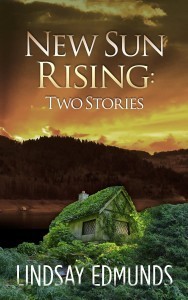 New Sun Rising by Lindsay Edmunds
New Sun Rising by Lindsay Edmunds
New Sun Rising is about a girl who was raised in a utopian community and leaves home to make her way in a dystopian society. The year is 2199; the place, the Reunited States
Story 1, “The Town With Four Names,” describes the lakeside village in which the girl was raised. It has survived against all odds for more than three hundred years. Cassie Stillwater, a 90-year-old descendent of the original founder, writes down the town’s history.
Story 2, “Leaving Home,” is about the girl’s decision to seek a life outside the town gates. She finds a job that horrifies her parents, who think they raised her too well and protected her too much. They fear she is not suited for life anywhere BUT their idyllic town.
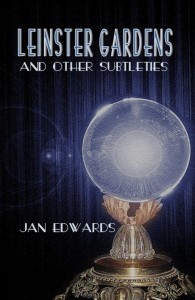 Leinster Gardens and Other Subtleties by Jan Edwards
Leinster Gardens and Other Subtleties by Jan Edwards
Fourteen short stories by Jan Edwards, including the BFS award short-listed ‘Otterburn’, plus a previously unpublished tale. “All adeptly told, often with a sense of locale and time neatly placed within the narratives. Her family history informs and inspires some of her stories. Folklore figures as a focus in more than one story, whether urban myth or historical lore. But ghostly they are and deceptively disturbing.” (42,000 words)
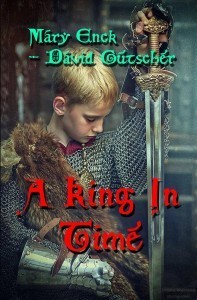 A King in Time by Mary Enck and David Gutscher
A King in Time by Mary Enck and David Gutscher
Arthur, Prince of Wales and future King of England, must decide if he wants to return to his own time in 2100 A.D.
Like his predecessor, the Legendary King Arthur, the passion of the young prince is to rebuild ancient Camelot. When he visits the original site, he encounters a prophetic gentleman who seems to know the future, or perhaps he speaks of the past.
Later, as Prince Arthur ponders the true identity of the man, a total solar eclipse occurs and propels him into the Fifth Century. It is only when the prince finally accepts the eclipse has directed the event, time begins to slip once more. It is then he discovers there is more to consider than space-time theories.
The sun has wiped out nearly all technology in the largest coronal mass ejection in history. In its wake comes the zombie apocalypse. The dead have risen, and they are hungry.
Yet there are greater threats than the walking dead. The deathless have returned, slumbering in the same Arks that carried the werewolves into the present. If they are not stopped they will build a massive necropolis in the remains of San Francisco, and the entire continent will pay the price.
Only the few werewolves created before the apocalypse stand between humanity and annihilation. Yet they are outnumbered and alone. Their only hope comes from the very enemy that sought to stop their creation, Mohn Corp.
This is the sequel to No Such Thing As Werewolves.
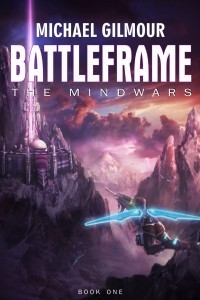 Battleframe by Michael Gilmour
Battleframe by Michael Gilmour
Resource rich planet Alpha Three becomes the focus of a galactic wide conflict. In the midst of a remorseless Scourge invasion a lone human battleframe pilot, call-sign Whizzbang, strives to find and rescue his closest friend from the invaders.
With the extermination of the human colony seemingly inevitable, Whizzbang’s squad of veteran pilots struggle to turn the tide of the war. Just when he thinks they may have a chance, members of the squad begin vanishing before his eyes and the odds of winning the battle become slim to none.
The mysterious nano-robots, unknowingly developed by an alien intelligence, appear to be all that will enable humanity to survive the onslaught. But all is not what it seems as the micro-machines begin to dramatically transform Whizzbang’s friends in astounding ways.
Safe within his command dome, the enemy General plots on how he can cover the world in the enigmatic Barrier, a force that kills humans in seconds. It is then that Whizzbang discovers that the Earth may be the next Scourge target.
Book one in the “Mindwars” opens with our galaxy in turmoil and humanity on the brink of extinction.
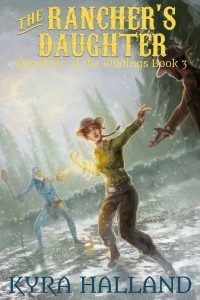 The Rancher’s Daughter by Kyra Halland
The Rancher’s Daughter by Kyra Halland
Once a hunter of renegade wizards, Silas Vendine is now on the run from the law himself. He and Lainie are living on what Lainie can win at cards and whatever odd jobs Silas can get from people who need his skills and don’t ask too many questions.
When Lainie’s luck with the cards turns sour, they are led to a meeting with one of the richest ranchers in the Wildings. Brin Coltor wants Silas and Lainie to undertake a dangerous mission into A’ayimat territory for him, and they can’t afford to turn him down. But Coltor is hiding a few secrets of his own, that lead Silas and Lainie right into the trouble they’ve been trying to avoid.
Book 3 of Daughter of the Wildings.
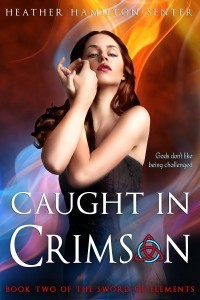 Caught in Crimson by Heather Hamilton-Senter
Caught in Crimson by Heather Hamilton-Senter
CAUGHT IN CRIMSON, sequel to the Amazon Bestseller BOUND IN BLUE:
What if you were the monster of your own story?
Armed with Excalibur, Rhi comes to Las Vegas to learn to control both her ability to see magic as color and her hunger to possess it, but from the moment she arrives, she’s consumed by the colors of flame. Rhi has to find her mother—the earth witch Guinevere—before Merlin decides she’s outlived her usefulness, but an ancient artifact of the earth magic keeps calling to her with a fire she may not be able to resist, even at the cost of her life.
The choices caught up in color and magic are never black and white.
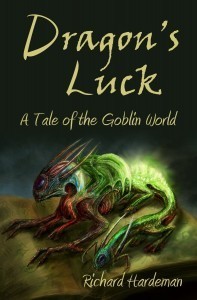 Dragon’s Luck by Richard Hardeman
Dragon’s Luck by Richard Hardeman
Tips for Survival on the Goblin World
(1) Never trust a goblin.
(2) There are no more dragons. There are other monsters.
(3) Don’t piss off the fairies. Seriously.
(4) Almost everything here will want to eat you.
Studying the list in his hand, Dobbins knew he had to escape the Goblin World. He had a shape- changer to help him, so that was good. He’d had to join forces with a woman who hated him, so that was bad. For any chance at survival, his group of three would have to rely on the fairies. But the fairies can’t stand Dobbins, either.
And that tip about dragons?
Zneeth, the Dragon King, is angry, hungry, and on their trail….
The scene shifts to Hartshire in the Earth Realm from Nambroc in the Nether Realm in Crepier, the third novella in the Nambroc Sequence, a fantasy series.
Crepier, an accountant and black market financier, wants to retire and be financially set for the rest of his life.
To achieve this goal, he convinces Watley Greywall, local crime lord in Hartshire, to get behind his idea of establishing Hartshire Bank.
Other elements of the Hartshire criminal underworld are of two minds about this possibility.
One segment of the Hartshire criminal underworld wants to get involved with this opportunity to start a bank because it is a legitimate commercial enterprise and a way to launder their ill-gotten gains.
Another segment believes the bank will the draw attention of the Hartshire Constabulary, which would be more problems than it is worth.
All that matters to Crepier is establishing the Hartshire Bank, and nothing or no one will stop him.
This is book 3 in the Nambroc Sequence.
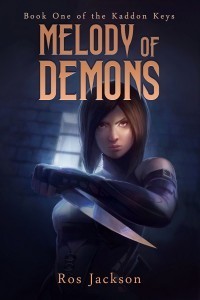 Melody of Demons by Ros Jackson
Melody of Demons by Ros Jackson
In her home village, Aivee is worse than nobody. If her secret identity as a half-demon leaks out, she’s dead. But in the capital city she will reinvent herself as a dancer. She’ll be wealthy, and adored by thousands. Nobody will be able to hurt her.
Will they?
Nori knows how cruel the city can be. She’s lost her mother to its plagues, and lately her younger sister has joined the ranks of its disappeared. But she’s not giving up. The ruling classes think they can treat people worse than beasts and strip them of their human rights. Powerful factions want to keep the epidemic of missing people a secret. Well, they can eat her blades.
Nori joins a group of vigilantes fighting for answers, and voices in her head urge her to recruit Aivee to the cause. These vigilantes are bumbling amateurs, as likely to get themselves killed as to save anyone. But Nori is changing, going mad, lusting for battle and remembering centuries-old conflicts. She will whip them into shape, or die trying.
Bloodthirsty gangs, inhuman mages, and dragon gods have it in for the people of Kaddon city.
Yes, Nori is mad. But she’s not nearly even.
Grayson Dynamics, led by the illustrious Mick Grayson, is the most powerful technology firm in the world. But underneath the fame and fortune exists a dark and dirty history. Corruption. Lies. Betrayal.
Now, a woman with a grudge intends to wipe clean that filthy slate—by killing the CEO who wronged her years ago and ending the global coup he’s been planning for years.
And how will she accomplish this? With her newly acquired neural enhancements, of course. Complete with the power to manipulate the minds of others.
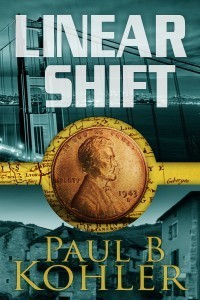 Linear Shift by Paul B. Kohler
Linear Shift by Paul B. Kohler
No one said time travel would be easy.
Peter Cooper, a widowed father of two whose life is crumbling around him—until a bizarre encounter with a desperate Army general launches him on a risky mission: to go back to 1942 and change a moment in time. The repercussions will almost certainly alter the conclusion of World War II. But will the ripple effects stop there? And what kind of life will Peter return to?
Unknown Consequences:
A successful mission may not have the success he had intended.
Sarcastic demon-slayer extraordinaire Jordan Amador has been locked in a year-long struggle to hunt down the thirty silver coins paid to Judas Iscariot. The mere touch of these coins is enough to kill any angel.
Jordan’s demonic opposition grows more desperate with each coin found, so they call on the ultimate reinforcement: Moloch, the Archdemon of War. Moloch puts out a contract on Jordan as well as her estranged husband, the Archangel Michael. Now Jordan and Michael will have to find a way to work together to survive against impossible odds and stop Moloch’s plan, or else he’ll wage a war that will wipe out the human race.
The Holy Dark is the third novel and fourth book in the Black Parade series, following The Black Parade, The Deadly Seven: Stories from The Black Parade series, and She Who Fights Monsters.
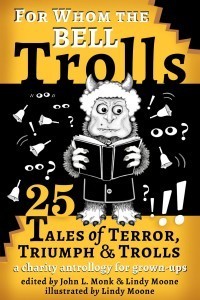 For Whom the Bell Trolls, edited by John L. Monk and Lindy Moone
For Whom the Bell Trolls, edited by John L. Monk and Lindy Moone
Funny, touching, suspenseful—sometimes romantic, titillating and shocking—there’s something for all adult readers in this unique illustrated anthology from 23 authors. Arranged from light to meaty fare, the antrollogy’s “menu” offers up fanciful and farcical stories, family-oriented tales, romance, mystery, high peak adventure, even magically surreal literary stories—starring all sorts of trolls, from the all-too-real Internet variety to the mythical mountain and bridge-dwelling trolls of legend. Readers will laugh nervously at Humphrey the half-breed’s unfortunate beginnings, and bite their nails on behalf of Fergus Underbridge, hard-boiled troll detective. They’ll cheer a not-so-ordinary troll-fighting girl and want to hug—or slap—a woman lost in her own neighborhood. And whatever should be done about the boy with the head of a dragon…?
 Time Quirks by A. Peter Perdian
Time Quirks by A. Peter Perdian
*** Quirky Time Portals ***
Time Quirks is a science fiction novella, a tale of alien colonizers desperately searching for a new home. Long-range sensors and remote probes have located a distant planet that meets the requirements of their species. A ship is sent to investigate this new world, but upon taking up orbit around the planet, the ship’s crew encounters a major problem. The world is already occupied.
Excerpt:
Jazloo faced the captain in his private study adjacent to the ship’s briefing room, trying not to lose her temper. “I can’t believe you’re seriously planning on bringing back live bipeds for dissection.” She’d waylaid Tusec in the corridor outside his quarters as his sleeping cycle ended, demanding to speak with him about the upcoming shuttle mission to the planet below.
Excerpt:
An odd prickling sensation engulfed Eric. “What the—” He stopped in mid-sentence, scared at what felt like crawling bugs on his flesh. The frightening sensation raced inward until it imploded at its point of convergence. His feeling of being compressed into nothingness vanished, smothering his scream.
With her Djinn lover captured by a band of human survivors intent on discovering a way to defeat their otherworldly foes, Jessica Monroe must make a terrible decision — throw in her lot with the humans, forsaking the one who helped her survive the destruction of civilization, or turn her back on humanity and follow the urgings of her heart.
This is book 2 of the Djinn Wars, following Chosen.
In what used to be the suburbs of Chicago, a community lives and breathes despite the Silents in the wilds beyond. Until the unthinkable happens – the zombie-like Silents begin to recover their reason. The stage is set for a conflict between survivors and recovered, and between old ways and new.
This is book 3 of The Silent Years series, following Mother and Crone.
In the aftermath of a battle a ship drifts helplessly in space. Is the strange new warship they were fighting still out there? Will it come back for them? Commander Johnson faces a desperate race to get her destroyer back into action and save her crew.
“This is an incredible work … suspense, mystery and intrigue.”
“Loved every word of it.”
‘Independence’ is a short story (6000 words) in the Two Democracies universe. The series will continue with the novel ‘Liberty’.
 Cold Hands, Warm Heart by Hollis Shiloh
Cold Hands, Warm Heart by Hollis Shiloh
Jason is self-conscious about his metal arm and uncomfortable with his sexuality. A big, quiet guy who intimidates a lot of people without even trying to, he works as a cook — and has a hopeless crush on his friend, Dr. Kingsley. Will Jason ever have a shot with his friend? Or does life have a different curveball to throw him?
Approx. 22,000 words
A steampunk-themed gay romance.
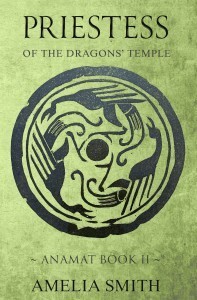 Priestess of the Dragons’ Temple by Amelia Smith
Priestess of the Dragons’ Temple by Amelia Smith
Once, Iola flew with a dragon. She might fly again, but only if she can become ambassadress to the dragons’ realm. First, though, she must navigate life as an ordinary priestess, which is not quite what she’d hoped for. Some of her fellow priestesses dragon-blind and corrupt. Worse, they see Iola’s devotions as evidence of greed.
Then the ambassadress returns, too sick to fly again. Iola and three other young priestesses are chosen nurse her, and to have a chance at taking her place. Iola’s main rival, Tiagasa, was raised in a prince’s palace. She thrives on political intrigue and gossip, and her lover is about to become governor of the city.
Iola is just a village girl dazzled by dragons. Her few friends and allies aren’t much more savvy than she is. Still, they hope to persuade the new governor – whoever he might be – to make Iola ambassadress, and to choose faith over scheming, one way or another.
This is the sequel to Scrapplings.
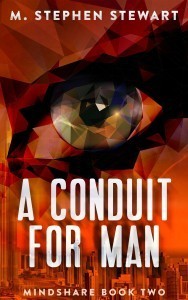 A Conduit for Man by M. Stephen Stewart
A Conduit for Man by M. Stephen Stewart
Seventeen-year-old Henry Malone’s mind is no longer his own—along with the sum total of humanity’s knowledge, another consciousness has been stuffed into his brain. It plagues him with visions, speaks and acts through him, and worst of all, it’s killing him. He’s quickly running out of time, and if he dies, all of humanity’s knowledge goes with him. His only hope for survival is finding Planetary Link’s top Neurotechnician, Doctor Carter. But in order to get to her, he must cross into a world where his actions have plunged society into chaos—then compel the Doctor to betray her employer before his own mind destroys him.
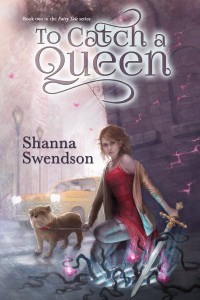 To Catch a Queen by Shanna Swendson
To Catch a Queen by Shanna Swendson
Uneasy lies the head that wears a crown–especially the crown of the fairy realm…
Sophie Drake has made a promise, and she never breaks her word. She will free Michael Murray’s long-lost wife from the fairy realm even if her intensifying feelings for him make it the most painful thing she’s ever done.
But Sophie is running out of time. Dark fae forces are stirring, threatening the human world. To make matters worse, humans are being cast out of the Realm, whether or not they want to leave, and the shock from these sudden evictions can even prove fatal. It’s only a matter of time before it happens to Michael’s wife.
All this in the name of the fairy queen.
Stunned, Sophie knows this is impossible because she’s the queen. She won the throne fair and square, through trials and blood.
Now she must find and fight an impostor for a crown she never wanted in order to save both the Realm and the human world.
This is the sequel to A Fairy Tale.
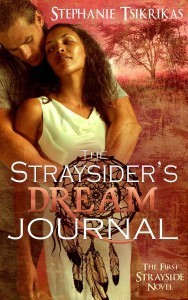 The Straysider’s Dream Journal by Stephanie Tsikrikas
The Straysider’s Dream Journal by Stephanie Tsikrikas
ONE FIRST DATE CAN CHANGE YOUR ENTIRE LIFE…
When Celeste Cannonier takes her best friend’s advice to try online dating, she finds herself instantly intrigued by Valentine “Bug” Warren, an antiques dealer with a tumultuous past. It was hardly love at first sight, but one thing led to another and what should have been a one-night stand has turned into a life-and-death adventure as Celeste and Bug uncover the meaning of their dreams — dreams they share, that are really memories from another dimension.
 Send to Kindle
Send to Kindle
April 23, 2015
New Helen Shepherd Mystery Available: Egg Hunt
As I said before, there will be a couple of promotional posts in the next few days before we return to our regularly scheduled neepery about books, films, TV shows, writing, the Hugo Awards, etc…
This particular promo post is an announcement for the next book in the Helen Shepherd Mysteries series. It’s called Egg Hunt and was intended to be an Easter themed mystery. Alas, I didn’t quite manage to finish it in time, plus one of the bigger vendors was very slow in getting the book up, so now it’s a two weeks past Easter mystery.
If you’ve been meaning to read all of the Helen Shepherd Mysteries to date (there are eight), there is a handy series bundle at a reduced price available exclusively at DriveThruFiction.
Egg Hunt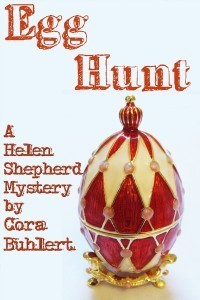 When a priceless Fabergé egg goes missing from a locked room in the London townhouse of Russian oligarch Yevgeny Ivanov, everybody quickly suspects Eva Hart, Ivanov’s cleaning lady and single mother.
When a priceless Fabergé egg goes missing from a locked room in the London townhouse of Russian oligarch Yevgeny Ivanov, everybody quickly suspects Eva Hart, Ivanov’s cleaning lady and single mother.
But Detective Inspector Helen Shepherd has her doubts about this theory, for Eva Hart has no motive, since the egg is unsellable on the free market. But what does Eva’s little daughter Emily know? And what happened to the egg?
More information.
Length: 7500 words
List price: 0.99 USD, EUR or GBP
Buy it at Amazon US, Amazon UK, Amazon Germany, Amazon France, Amazon Netherlands, Amazon Spain, Amazon Italy, Amazon Canada, Amazon Australia, Amazon Brazil, Amazon Japan, Amazon India, Amazon Mexico, Kobo, Barnes & Noble, Apple iTunes, Scribd, Oyster, Smashwords, Inktera, txtr, Thalia, Weltbild, Hugendubel, Der Club, Libiro, Nook UK, DriveThruFiction, OmniLit/AllRomance e-books, Casa del Libro, Flipkart, e-Sentral, You Heart Books and XinXii.
 Send to Kindle
Send to Kindle
April 22, 2015
German perspectives on SFF, a Hugo Survey and the best “Age of Ultron” review you’ll read today
The 2015 Hugo Awards debate is still dragging on and to those of us outside the US, it is very clear that the Hugos and Worldcon have been dragged into the increasingly toxic US culture war between the beleaguered nutty nuggets of the right on the one side and well-meaning advocates of more diversity on the other.
It is also increasingly clear that the Hugos not our award and never has been – even though the latest round of disqualifications and withdrawals lifted two works of translated fiction by non-US writers – The Three-Body Problem by Chinese writer Liu Cixin, translated by Ken Liu, and The Day the World Turned Upside Down by Dutch writer Thomas Olde Heuvelt, translated by Lia Belt, onto the ballot, which is a positive sign.
What is more, those of us outside the US don’t feel very well represented by either of the two sides in the Hugo conflict, because the Sad Puppy side doesn’t seem to be aware that there is life and SFF outside the US, while the side of the so-called “Social Justice Warriors” is still very US-centric in spite of its focus on diversity.
For a German perspective on this year’s Hugo debate, check out the coverage at the German genre blog Lake Hermanstadt.
What is more, Shaun Duke has created a survey about the Hugo Awards specifically aimed at Non-US SFF fans and readers. If you’re not American and are an SFF fan, reader or writer (I know there are a few of you here), please take the survey and spread the word.
***
However, there are times where those of us here in Europe have a slight advantage over the US. Case in point: Here in Europe, Avengers: Age of Ultron opens tomorrow (well, the midnight screenings are already through and Twitter is abuzz with excited chatter), whereas the US has to wait until May 1.
This also means that newspapers are full of Age of Ultron reviews. Now I always find German reviews of US superhero movies interesting, especially since superheroes are not nearly as ingrained in our cultural landscape as in the US and are frequently considered simplicistic fare for children. Hence we sometimes get reviews which spectacularly miss the point such as the infamous “Captain America is not a horse” of The Winter Soldier in Die Welt, in which the reviewer is surprised that Captain America: The Winter Soldier is not a sequel to The Horse Whisperer in spite of starring both Scarlett Johansson and Robert Redford.
Though it is notable that German newspapers and magazines often seem more interested in the fact that many small town cinemas are boycotting Age of Ultron because of a dispute about fees and profit shares.
Luckily, Die Welt got a better reviewer for Age of Ultron, one who actually understand the genre and the Marvel phenomenon and who doesn’t expect sequels to The Horse Whisperer or Zodiac or Less Than Zero, even though some the same actors happen to show up in Age of Ultron. This review at Spiegel Online is also pretty good. Both are largely spoiler-free as well.
However, my favourite German review of Avengers: Age of Ultron and likely my favourite review of the movie period is this review by Dietmar Dath from the Frankfurter Allgemeine Zeitung, the man who also wrote my all-time favourite review of The Avengers. It’s actually less of a typical movie review (but then German does not distinguish between reviews and criticism) and more a detailed dissection of US pop culture in general (even the conservative freakout about the Legends of Korra finale is mentioned) and Avengers: Age of Ultron in particular. It’s spoiler-free, too, though one half-sentence makes me worry a bit about one of our heroes. But then, Age of Ultron is a Joss Whedon film and Whedon always makes me worry whether everybody will make it through alive.
Coincidentally, I was watching season 1 finale of Agents of S.H.I.E.L.D with my Mom recently and she became quite worried about the survival of Fitz and Simmons when both were trapped in that container on the ocean floor. “Don’t worry”, I said to her, “I know Joss Whedon’s name is in the credits, but the showrunners are actually his brother and sister-in-law and for once they don’t kill any of our heroes.”
 Send to Kindle
Send to Kindle
April 18, 2015
The Obligatory Birthday Post 2015
So today (well, yesterday actually) was my birthday.
Since my parents had to go to the 50th birthday of a colleague of my Dad’s in the evening, I had lunch with them instead at a local Thai restaurant (which is actually run by a family of Vietnamese origin).
And since that meant I was alone in the evening, I settled down with a DVD. Initially, I was planning to watch The Avengers, because it’s a feel-good film. But since my Mom wants to see that one again in preparation for Age of Ultron, I’m going to watch it with her, so I opted for Guardians of the Galaxy instead, which is another largely cheerful feel-good movie.
Coincidentally, I just found last year’s birthday post and realised that I apparently watched The Avengers on my birthday last year. So apparently, it’s almost something of a tradition to watch Marvel superhero movies (but only the happier ones) on my birthday. But then, Marvel superhero movies usually leave you feeling really good afterwards and you want to feel good on your birthday.
By the way, for years I used to watch a Star Wars movie on my birthday, usually timed to coincide with my annual rewatch of the original trilogy (with or without the prequels). I don’t know why I stopped, but I guess it’s because I’ve seen the Star Wars movies a lot more often by now than any of the Marvel movies. Besides, I’m rather over Star Wars at the moment, though I’ll always love the original trilogy.
Okay, so the new trailer for The Force Awakens looks a lot better than I thought it would, especially since I can’t stand J.J. Abrams’ work. I particularly liked the hint at an interracial relationship (plus Han, plus Chewie, plus Luke). And I will probably see it come December. But I’m not nearly as excited about this one as I was about the prequels. For me, Star Wars is a story that has been told.
Talking of trailers, the trailer for Ant-Man also looks surprisingly good, especially considering that this is probably the Marvel movie I am least excited about. I’ll probably see it at some point, but I might simply wait for the DVD.
On the other hand, the trailer for Batman vs. Superman: Dawn of Justice looks completely unenticing. I’m not a fan of DC’s grimdark superhero movies anyway (though I like their TV offerings) and this one looks even worse than some of the previous ones. And very, very grimdark.
Finally, here are some photos:

Wrapped presents

Me unwrapping presents.

My Mom with me unwrapping presents in the background.

My Dad takes a nap on the couch. I actually snapped a photo, because his posture is so weird.

Behold the loot! Books mostly, plus some chocolate, a bottle of plum wine and a nice haul of cards.
 Send to Kindle
Send to Kindle
April 15, 2015
A new fantasy story available and Cora participates in an SF Signal Mind Meld
First of all, I was invited to participate in SF Signal‘s regular Mind Meld feature. The subject this time around was cities in science fiction and fantasy. You can see my answer as well as those of Kelly McCullough, Beth Cato, Joe Sherry, Rachel Aukes, Lisa McCurrach, Howard Andrew Jones and Fran Wilde here.
Then, as I mentioned before, I’ll have a few new releases and promotional posts upcoming, though they were derailed a bit by all the Hugo drama (updates coming soon), my parents’ golden wedding anniversary and Günther Grass dying. Still, here is the first new release.
The story in question is called Albrecht, the Nightmare. It’s both a paranormal romance and a contemporary and it draws quite heavily on North German folklore, particularly on the crossed horse head gables that are a common feature of the Low German farmhouse and the fact that they were intended to ward off evil, particularly in the form of nightmares or alps, a German take on the classic incubus/succubus legend.
Most stories start with “What if…” and this one was no different, for one day I found myself wondering what if the crossed horse head gables really do work as a deterrent against nightmares. It also occured to me that what used to be horror stories – young women being molested by vampires, werewolves, demons, fae, nightmares, etc… – have now been recast as paranormal romances. And in the context of a paranormal romance, the old warding spell represented by the crossed horse head gables could easily become a romantic obstacle.
So I came up with the story of Albrecht, a nightmare who falls in love with Lina, a student and single mom (because nightmares have a thing about breast milk), and finds himself unable to be together with his beloved due to the ubiquitous crossed horse head gables, when they move back to Lina’s home village in rural North West Germany (the village of Altenmarhorst, which is a real place BTW).
I also included a genuine local legend, namely the story of Lambert Sprengepiel of Vechta, a cavalry officer during the Thirty Years’ War, who according to legend made a deal with the devil in order to be able to vanish into thin air (in fact, he merely used guerilla warfare tactics) and was cursed to roam the moors around Vechta in the form of a demonic hellhound after his death.
I’ve been fascinated by Sprengepiel’s story since I first came across it while teaching at the University of Vechta. I’ve always wanted to use him as a character in a historical fantasy (and I will almost certainly do so someday). And since Albrecht, the Nightmare is set in Sprengepiel’s old stomping ground, including him was a no-brainer. In the story, he decides to reenter modern politics by running for mayor, though he occasionally has to be reminded that the Thirty Years War has been over for more than three hundred years.
A word of warning, this story also contains political satire (hey, I insinuate that former German Secretary of Finance Theo Waigel is a werewolf). Plus, it has Albrecht, Lina and Lambert Sprengepiel fighting against bigotry and bureaucracy in the form of a local councillor. In short, it’s one of those nasty pieces of message fiction that are ruining SFF according to some very vocal whiny canines (Lambert Sprengepiel would probably have them for breakfast).
Albrecht, the Nightmare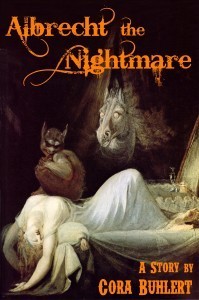 Germany in the near future: When supernatural beings come out of the closet and reveal themselves as having lived among humanity all along, the country quickly adjusts to the new reality after some initial uproar. Romances between humans and supernaturals soon become common, such as the relationship between Lina, a human single mother, and Albrecht, a nightmare demon.
Germany in the near future: When supernatural beings come out of the closet and reveal themselves as having lived among humanity all along, the country quickly adjusts to the new reality after some initial uproar. Romances between humans and supernaturals soon become common, such as the relationship between Lina, a human single mother, and Albrecht, a nightmare demon.
But Albrecht’s and Lina’s love is threatened when they leave Berlin for Lina’s home village in rural North Germany. For it turns out that the village is suffused with an ancient magic, a warding spell specifically designed to keep nightmares out.
More information.
Word length: 5800 words
List price: 0.99 USD, EUR or GBP
Buy it at Amazon US, Amazon UK, Amazon Germany, Amazon France, Amazon Netherlands, Amazon Spain, Amazon Italy, Amazon Canada, Amazon Australia, Amazon Brazil, Amazon Japan, Amazon India, Amazon Mexico, Kobo, Barnes & Noble, Apple iTunes, Scribd, Oyster, Smashwords, Inktera, txtr, Thalia, Weltbild, Hugendubel, Der Club, Libiro, Nook UK, DriveThruFiction, OmniLit/AllRomance e-books, Casa del Libro, Flipkart, e-Sentral, You Heart Books and XinXii.
 Send to Kindle
Send to Kindle
April 13, 2015
In Memoriam Günther Grass
Yesterday, German novelist, poet and artist Günther Grass died of a lung infection aged 87. His death caused an outpour of tributes and condolences from writers and politicians worldwide. Deutsche Welle and The Guardian have collected a few of them. The Guardian also shares some of their favourite Günther Grass quotes, while kulturzeit has a wonderful video tribute (in German).
Günther Grass was one of the ten German winners of the Nobel Prize for Literature along with Theodor Mommsen, Rudolf Eucken, Paul Heyse*, Gerhart Hauptmann, Thomas Mann, Herrmann Hesse, Nelly Sachs**, Heinrich Böll and Herta Müller, who with Grass’ death remains the only living German winner of the Nobel Prize for Literature, for Elfriede Jelinek, the other German language winner, is actually Austrian.
If you grew up in Germany post 1945, Günther Grass was always there in the background of your life, a mustacchioed pipe-smoking presence that looked like one of Saddam Hussein’s lost doppelgangers. You probably read him in school along with his Gruppe 47 fellow travelers Heinrich Böll, Siegfried Lenz, Hans Magnus Enzensberger, Martin Walser, Walter Jens, Ilse Aichinger and Ingeborg Bachmann. Or maybe you secretly read him under the covers by night, looking for the good bits, like my Mom. That scene in The Tim Drum with the sherbet power in Maria’s bellybutton blew a lot of minds and probably caused dozens of imitations. And even if you never read The Tim Drum or the Danzig Trilogy, you probably know who Oskar Mazerath, the boy with the tin drum and the shrill voice who wouldn’t grow up, is. Later, you probably either rolled your eyes or nodded along, whenever Grass decided to wade into the hottest political controversy of the day – again. He probably pissed you off at some point, cause he pissed everybody off. You may have quietly gloated when it came out that Grass, then seventeen, had been a member of the Waffen SS for a few months in 1944/45 (Look, the moral paragon has been revealed to have been a bloody hypocrite), and you’re probably just as pissed off today at the obituaries from foreign papers that reduce his life to just these few months and an ill-advised poem.
Like so many, I first encountered Grass and his Gruppe 47 compatriots in school. He was what I used to call a “German textbook writer”, i.e. a German postwar writer likely affiliated with Gruppe 47 whose sole purpose seemed to be to fill German literature textbooks with dull fiction and even duller poetry that for some reason was always about either Poland or World War II or Poland during World War II. Looking back, it’s not surprising that Günther Grass and his Gruppe 47 pals had little to say to West German teens of the 1980s (okay, I kind of liked Heinrich Böll’s Lost Honour of Katherina Blum). We weren’t interested in reminiscences of lost Eastern Prussia or Silesia or Gdansk, places which had been Polish for decades before we were born and were now mostly associated with war and strikes and protests and martial law. The fact that our teachers didn’t properly explain references that couldn’t make any sense to 1980s teens (Don’t know what a potato fire is? You’re stupid and spoiled. So you stopped asking.) didn’t help either. I had to grow up to appreciate Grass and Lenz and the others. And it makes me sad how many teenagers will be turned off these authors for life by incompetent teachers.
I can pinpoint exactly what it was that made me reappreciate Siegfried Lenz as an adult. I don’t know what it was that made me reappreciate Günther Grass. Maybe it was the realisation that Grass was an SFF writer, though he probably never saw himself as such. Bruce Sterling famously coopted Günther Grass or more precisely The Tim Drum for his Slipstream manifesto, but The Flounder, a fairy tale retelling written before it was cool, and his apocalyptic novel The Rat, in which Grass destroys the world and nukes Oskar Mazerath to finally get rid of him (Didn’t work. Oskar survives), are much better examples.
But what also made me admire Günther Grass as an adult was his absolute fearlessness. Günther Grass was a man who spoke out what he thought, a man who never met a controversial subject he did not have an opinion on. And he usually didn’t care whom those opinions pissed off. He campaigned for the Social Democratic Party back in the 1960s, when this was still controversial, and later broke up with them, when he disagreed with the pro-business and anti-welfare policies of Gerhard Schröder. He pissed off the Turkish state by criticising their treatment of Kurds, Armenians and other minorities. He spoke out against war and against nuclear power. He wrote a poem criticising Israeli politics and got labelled an antisemite for his troubles. He occasionally seemed to be surprised and disappointed by the backlash his airing of his opinions tended to cause, but I don’t think he really cared.
In the speculative fiction community, there is currently a big debate going on about the place of politics in fiction and about whether authors should be allowed to have opinions at all, let alone speak about them in public. There are rightwing authors claiming that they have been discriminated against and shunned (a curious word that has no German translation) for their political and religious views, though there is currently little concrete evidence for this. And there are leftwing authors who are afraid to speak up for fear of attracting trolls and worse to their blogs.
When I heard that Günther Grass had died, my first thought was, “What a pity! Now we’ll never hear his views on the Hugo debate.” Now I strongly suspect that Günther Grass had no idea what the Hugo are. Nonetheless, he was famous or rather infamous for having an opinion on everything. And he was never afraid to state that opinion.
In the light of the current ugly climate in the SFF community, Günther Grass strikes me as even more amazing. Because here was a writer who was also a highly political person and who was not afraid to speak out, even if it cost him awards and nominations and got him shunned. He was involved in a couple of long running literary feuds without the whole thing descending into abuse and death threats. I think we could do worse than take him as a role model.
By the way, The Tin Drum was published in 1959 and became a worldwide bestseller and as well as a genuine mainstream success. Even my grandmother read it and she usually tended more towards bloated family sagas and fluffy historical fiction. Günther Grass won the Nobel Prize for Literature in 1999, so he only had to wait for forty years to finally receive recognition. Take that, whiny puppies.
Comments closed because I neither feel like dealing with whiny puppies nor people who feel that Grass was a Nazi and nothing else.
*Don’t worry, if you have never heard of Mommsen, Eucken and Heyse. Hardly anybody has, except for German scholars.
**Hesse and Sachs held Swiss and Swedish citizenship respectively, when they were awarded the Nobel Prize, but are usually considered German writers.
 Send to Kindle
Send to Kindle
April 12, 2015
My Parents’ Golden Wedding Anniversary
This past week was not just Hugo kvetching week, but there were also other things going on.
For example, yesterday, my parents celebrated their golden wedding anniversary. The actual anniversary was on Thursday, April 9th, but because most people are working on Thursdays, they decided to hold the big party on the weekend.
And before anybody wonders, nope, I’m not that old. My parents had me several years after they got married.
Now I’m an introvert and not a party person at all. Nonetheless, the party was nice. Plus, I finally had an excuse to wear that really great dress that I rarely get to wear and use my beaded evening bag, which unfortunately dates from the pre-cellphone era, so I had problems stuffing mine into the bag.
I’m not going to bore you with photos of the party, but here is the invitation I made for my parents. I took some scanned wedding photos (the originals are here) and added some psychedelic graphics for that full sixties feeling, though only one person among the thirty-five guests got what I was trying to do:
 Send to Kindle
Send to Kindle
April 10, 2015
Iron Man goes West
Today, while I was grocery shopping I perused the “Romanheft” spinner rack at the supermarket and came across this western novelette, the title of which made me do a doubletake.
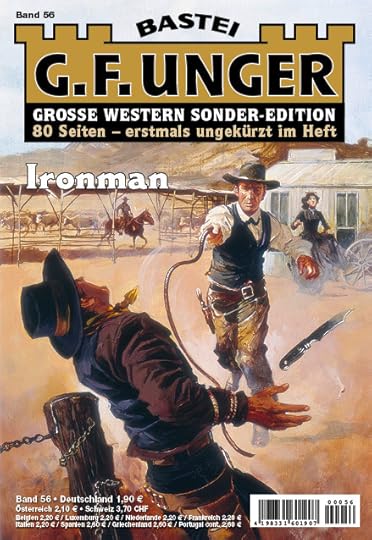
Now I’m pretty sure the title is a coincidence. For starters, because the series in question is a reprint line which republishes some of the more than 700 western novelettes penned by Gert Fritz a.k.a. G.F. Unger. I suspect this one dates from the 1970s, though there is no copyright date to be found. And since Unger died in 2005 (here is his obituary), he cannot have been inspired by the Iron Man movies. I also doubt that he was inspired by the Marvel comics, since US superhero comics were only available sporadically in Germany well into the 1990s. Of course, it’s possible that Unger somehow came across some Iron Man comics (the height of his writing career coincided with the silver age of comics) and simply borrowed the name because he liked it. Also note that Unger’s Ironman is spelled differently than Marvel’s.
I actually bought the novelette in question – how could I not? The story has a first person narrator named Jake Ringold, though it would have been amusing if his name had been Stark. The plot BTW involves Ringold being made the the sheriff of a small town in the Old West and tasked with protecting the town against bandits. In short, standard western stuff. Though I generally find the G.F. Unger westerns surprisingly readable.
On the other hand, maybe the protagonist of Unger’s Ironman is the grandfather of Howard Stark and therefore great-grandfather of Tony.
 Send to Kindle
Send to Kindle
April 9, 2015
The obligatory 2015 Hugo nomination reaction post
So the 2015 Hugo nominations were announced this weekend and the noxious Sad Puppies as well as the even more noxious Rabid Puppies managed to push many of their choices onto the ballot and completely dominate all three short fiction categories as well as best related work and the two editing categories.
A lot of people are understandably furious about this. There are even suggestions that the Hugo Awards are irrevocably broken.
I am one of those who are royally pissed off. Because frankly, I’m fucking sick of seeing the genre I love and its awards taken hostage in a purely US-based culture war that mainly exists in the minds of those waging it. I’m sick of seeing awards ballots swamped with substandard works that are only there because the author was either someone’s friend and/or of the right (i.e. rightwing) political persuasion. I’m angry on behalf of the Sasquan organisers who may well find themselves stuck with several surplus trophies, which cost between 300 and 500 USD to produce according to Kevin Standalee who should know. I’m sick of seeing people who harrass and attack others on the Hugo ballot. I’m furious that once the Hugos started making some baby steps forwards towards being a more diverse, inclusive and international award, they now take a massive leap back into the swamp that is US politics.
What is more, the Puppies don’t seem to live in the same reality as the rest of us, which might be funny, if their delusions didn’t hurt so many people. Case in point: In their reality, “Social Justice Warrior” is an insult, because being in favour of social justice is apparently a bad thing. In fact, the Puppies seem to repeat the same talking points over and over again in their own spaces as well as in the comments of every blog that lets them comment.
These points are, in no particular order:
SFF sales are declining, because what is being published no longer matches the tastes of “real mainstream fans”.
The Hugos are broken, because they tend to award works that “real fans”, whoever they might be, won’t read.
The Hugos don’t award bestselling authors and tend to award obscure low selling works, hence they are broken.
No one wants to read Hugo Award winners anymore, because the books are so bad and go to obscure literary works rather than core genre works.
What the Puppies did wasn’t bad, because there is a secret cabal of Social Justice Warriors that has been fixing the Hugos and issuing its own slates for years. For proof these people usually link to awards eligibility and open threads by John Scalzi or Charles Stross.
John Scalzi/Tor have been fixing the Hugos for years and are furious that it didn’t work this time.
No one could possibly enjoy Ancillary Justice/Throne of the Crescent Moon/Redshirts/If you were a dinosaur, my love/Chicks Dig Timelords enough to give it a Hugo, hence there must be tampering.
Ditto for all of those women and writers with ethnic names. No one could have possibly enjoyed their works and voted for them fairly, hence there must be tampering.
Those evil Social Justice Warriors deliberately kept Sir Terry Pratchett from winning a Hugo. (Wrong, he was nominated and declined.)
Hugo voters and Worldcon attendants despise regular SFF fans for being the wrong sort of fan. They despise people for loving The Avengers (which won a Hugo), Game of Thrones (which also won a Hugo) and videogames.
Everybody is ganging up on US rightwingers, Mormons and Catholics.
All of these claims are demonstrably false. The secret cabal of Social Justice Warriors, John Scalzi and Tor exists only in the minds of the Sad Puppies. There is no conspiracy – the only people who tried to fix the Hugos were the Sad Puppies and the Scientologists. Tor dominates the nominees in the fiction categories, because they publish some fine works (and note that last year and the one before, Orbit dominated) and because Tor.com is a free and easily accessible webzine with some very good stories, whereas e.g. Analog requires a subscription and isn’t available at news stands in many parts of the world at all.
The SFF genre isn’t dying, because it is no longer dominated by straight white American men, it is changing and growing, because other voices are finally being heard. If people are being blacklisted – and there is no evidence this is happening – it’s because they are raging arseholes and not because they are Mormons or Catholics or what the US defines as conservatives. Tor is not actually a bastion of leftwing conspiracy. In fact, Tor publishes Brandon Sanderson, who is Mormon and a decent person, and Orson Scott Card, who is Mormon and a raging homophobe. I’m sure they publish plenty of Catholics as well and apparently, they do publish John C. Wright, Catholic, Sad Puppy and raging homophobe. Oh yes, and Teresa Nielsen Hayden, Tor editor and favoured puppy target, was apparently raised Mormon herself.
Has there been campaigning for the Hugos before? Yes, there has been – sort of – as George R.R. Martin explains quite succintly here. Eligibility posts and recommendation lists are a form of campaigning and are usually the subject of much contention. Personally, I don’t do it, because it makes me feel uncomfortable, but I have no issue with those who do. And it would also be silly to assume that John Scalzi’s 40000 blog readers had nothing to do with his many Hugo nominations, especially for slighter works like an April Fool’s Day short story.
However – and this the various puppies don’t get – there is a difference between saying “Hey, these works of mine are eligible” or “I’m nominating this cool stuff, why don’t you check it out?” or even “Let’s crowdsource cool stuff to nominate” and setting up a slate of exactly five works in each category and then initiating a bloc voting campaign to push those nominees onto the ballot. The first three are common practices, even if some disagree with them. And indeed, if Brad Torgersen had stopped at crowdsourcing recommendations for works that Sad Puppy fans like and then put up a list of said recommendations, no one would be complaining, even if some of those recommendations had made it onto the final ballot. In fact, hardly anybody complained the first time Larry Correia did something similar back in 2013, though some people felt the way he did it was tacky and reeked of desperation.
However, the Sad Puppies and their even less pleasant brethren the Rabid Puppies didn’t stop there. A few big name puppies condensed the nominations made by their fans down to exactly the five needed for most categories, though they ignored Best Fan Artist and could only come up with one graphic work. Then they encouraged their fans and followers to nominate that slate and only that slate. Correia also got that noxious Breitbart site involved, while Vox Day pulled in the Gamergaters. They also blogged about their campaign not once or twice, but incessantly and often while using strident rhetoric about making Leftists and Social Justice Warriors cry. This is very different from saying “This is what I have available” and “This is what I like”.
So let’s go on to their claim that the Hugos have moved away from the tastes of mainstream SFF fans, whoever they might be, and that they tend to reward boring message fiction chosen for reasons of political correctness and not because anybody actually enjoys it.
Now the last part of that claim is flat out silly, because why would anybody nominate a work for a Hugo, if they didn’t enjoy it? Hard as it may be for the Puppies to comprehend, people nominated and voted for Ancillary Justice and Redshirts and Throne of the Crescent Moon and Chicks Dig Timelords and “If you were a dinosaur, my love”, because they genuinely enjoyed these works.
Taste – and again, this is something the Puppies just don’t get – is subjective. There is no such thing as an objectively good story, just as – issues of basic grammar and language competence notwithstanding – there is no such thing as an objectively bad story. For example, I found the five Puppy nominees in last year’s fiction categories close to unreadable (and I tried). The Puppies obviously disagree. On the other hand, the Puppies consider “If you were a dinosaur, my love” the worst story ever nominated for anything. Now I personally don’t much care for that story myself (I ranked it No. 3 out of four), but obviously a whole lot people disagree, as is evidenced by the fact that it was nominated for a Hugo and won the Nebula. Because taste is subjective.
I agree that there has been a shift or rather expansion in the demographics of SFF fandom, a shift that also manifests itself in changing reading tastes and therefore changes in what gets nominated for and wins awards. A lot of people, not all of them Puppies, are not happy about this and I certainly sympathise. If majority reader tastes shift away from your personal preferences, it sucks. I’m currently experiencing this in the romance genre, which is consumed by so-called new adult romance (basically overwrought stories about virginal college students with dark pasts falling in lust with tattooed billaire MMA fighters or bikers with tortured pasts who may or may not be their stepbrothers). Now I find new adult romance unreadable. The subgenre does nothing for me, but since it’s currently the hottest trend in town, it means there is very little romance for me to read.
Indeed, this is the one point where I have some sympathy for the Sad Puppies. Because if your personal reading tastes are no longer being catered to, if the subgenre you love most is declared dead by publishing fiat and a subgenre you hate is taking over everything, it sucks. However, the proper response to this is not to cry foul, blame nebulous conspiracies and generally attack everybody who likes the new direction of the genre.
Never mind that wherever this takeover of boring, literary message fiction is taking place, it’s certainly NOT the Hugos. George R.R. Martin takes a look at the Hugo winners and nominees of the past few years and finds a lot of traditional SFF nominated and even winning among the more literary works. There is no takeover by literary SFF and writers like Margaret Atwood, Cormac McCarthy, Justin Cronin, Kazuo Ishiguro, Colson Whitehead or Emily St. John Mandel are not even getting nominated, let alone winning. Never mind that more literary SFF being nominated for the Hugos and Nebulas is nothing new. For example, Kurt Vonnegut was nominated twice. Thomas Pynchon was nominated for a Nebula for Gravity’s Rainbow back in 1974 and promptly lost out to Arthur C. Clarke.
What is more, if you take a look at those past Hugo winners and nominees that the Puppies seem to hate most – Ancillary Justice, Redshirts, Throne of the Crescent Moon, Chicks Dig Timelords, “If you were a dinosaur, my love” – most of those books are actually core genre works. I would understand, if the Puppies were upset about the Hugo wins for Jonathan Strange & Mr. Norrell, The Yiddish Policemen’s Union, The Windup Girl (okay, I hated that one, too) and Among Others as well as by the nomination for Catherynne Valente’s Palimpsest, because those are the sort of slower, more literary works they claim to dislike. The Windup Girl has an environmental message, too. But Ancillary Justice is a rousing space opera with a feminist twist, Throne of the Crescent Moon is a fairly classic sword and sorcery novel with a Middle Eastern flair, Redshirts is an affectionate Star Trek parody with some mild structural experimentation, Chicks Dig Timelords is a collection of essays by well regarded writers, critics and actresses about a hugely popular SF TV show. In short, this is exactly the sort of populist classic core genre works the Puppies claim to champion. Unfortunately, they were also written by people the Puppies dislike, namely women, muslims, people of colour and John Scalzi.
I grant them “If you were a dinosaur, my love”, since it really is a more experimental story (though not as experimental as Kij Johnson’s “Mantis Wives”, which was nominated the year before) and only very tangentially speculative. I’m not sure why the Puppies persist in calling it “gay dinosaur porn”, since the central couple is actually straight (the guy is beaten into a coma because some homophobes mistakes him for gay, not because he is) and it’s certainly not dinosaur porn. If you want dinosaur pron, try this. However, I can see why people might not like “If you were a dinosaur, my love” (I wasn’t wild on it myself), though I have no idea why they are so hung up on that one story, which – let’s not forget – didn’t even win.
The Puppies’ claim that Hugo winners and nominees don’t actually reflect sales figures has some merit, but then the literary awards of any kind rarely reflect sales figures. Besides, if the Puppies wanted to nominate bestselling SFF authors who are routinely overlooked by the Hugos, they were quite unsuccessful at that. Now Jim Butcher usually hits the big bestseller lists, but Kevin J. Anderson usually hits them only with his tie-in works, not his original fiction. As for Marko Kloos, whose novel Larry Correia claims has outsold Ann Leckie’s series, Kloos might outrank Leckie on Amazon. However, Amazon is not the entire book market, either in the US or the world. But since Marko Kloos is published by Amazon’s 47 North imprint, it means his books are not available outside Amazon, because other bookstores refuse to carry them (a practice I disagree with), whereas Leckie’s are. What is more, Jason Sanford has done the math and found that Ann Leckie sells considerably better than many puppy nominees, though not as well as Jim Butcher. If the Puppies really wanted to get an overlooked bestselling SFF author on the Hugo ballot, Diana Gabaldon and J.D. Robb would have been much better choices as authors who have hit the big bestseller lists with book after book, even though the Hugo electorate has no idea they exist. Okay, so neither Written in My Heart’s Own Blood nor Concealed in Death and Festive in Death were their respective best works, but then Skin Game isn’t Jim Butcher’s best either.
So some works the Puppies don’t like have been nominated for and even won Hugo Awards. Tough luck. It happens. Of the Hugo winners for best novel since 2000, there were four I flat out hated, Blackout/All Clear, The Windup Girl and the two Vernor Vinge novels. And yes, I was pretty annoyed those books won, since they pushed out IMO much better novels. There also was a time in the early to mid 2000s when singularity fiction and new British space opera high on the technobabble and low on characterisation was dominating the Hugo nominations that I despaired of the awards, because I didn’t like those books at all. Because any single person’s reading tastes don’t necessarily align with those of the Hugo electorate. In the early 2000s, my own tastes were out of alignment, now the Puppies’ tastes are out of alignment. It happens.
However, the Puppies are not just angry that books they don’t like are winning awards, many of them would prefer that those books don’t exist period or at least shouldn’t be allowed to call themselves science fiction and fantasy. Take a look at this post from February 2015 by Brad Torgersen, who is actually moderate by Puppy standards, in which he laments the fact that there are books in bookstores with covers that look like the SFF of old, but contain things like feminism, anti-capitalism, global warming, characters of colour and GLBT characters that Brad Torgersen doesn’t want to read about. Not just has he apparently never heard of the fact that there are such things as blurbs, reviews and excerpts, which give you a better shot of avoiding reading books you won’t like, he actually wants to exclude those books from the genre altogether.
Let’s repeat this: This year’s spokespuppy wants to exclude books he doesn’t like from the genre.
Now plenty of people don’t like certain subgenres or trends. For example, I rarely like military science fiction, dislike singularity fiction and grimdark epic fantasy. However, I would never dream of saying that those works shouldn’t exist and that they have no place in the genre. I simply don’t want to read them.
Paul Weimer is inclined to be a bit more charitable towards the Puppies than me and separates between the Sad Puppies led by Larry Correia and Brad Torgersen, who want to return to some kind of imagined ideal status quo of the past, where they and the fiction they like were king, and the Rabid Puppies led by Vox Day, who want to burn it all down and dance upon the ruins.
To be fair, there are some bright spots in this year’s Hugo ballot. Both Ancillary Sword by Ann Leckie and The Goblin Emperor by Katherine Addison are wonderful novels and fully deserve their nominations. The Best Graphic Story slate looks very strong this year and includes the wonderful Ms. Marvel a.k.a. Kamala Khan, written by G. Willow Wilson, herself a muslim women. Expect Puppy heads to explode when they get the voters’ packet. Julie Dillon is the one bright spot in the pro artist category, the fan artist category is entirely untouched by Puppy interference and even the dramatic presentation categories include some fine works. Though I find it amusing that Captain America: The Winter Soldier was not on the Puppy ballot, probably because the Puppies no longer like Captain America now he has finally shed the Captain Nationalism persona that made him so unlikable during my comic reading days. I’m sure Steve Rogers would be proud.
As for what to do about this attack on the Hugos, at the moment there are several strategies being discussed.
Vote “No Award” across all categories to wipe this whole year from the record.
Vote however you like for non-puppy nominees and put all the puppies under “No Award”.
Give both puppy and non-puppy nominees fair consideration and put anything that’s bad under “No award”.
Form a counter slate next year.
Now I flat out hate option 4, because I like the idea that SFF fandom is – to quote Elizabeth Bear – “functioning, self-sustaining, multi-generational anarchy”. Like Elizabeth Bear, I also think slates are a horrible idea, because they would turn the Hugos into a version of the typically American bipartisan political system, which is actually the result of a very specific political and historical situation and not in any way a natural development. In fact, most countries have more multilateral political systems and more than two parties.
As for who would organise such a counter-slate, the names I hear mentioned most often are John Scalzi, bete noir of the Sad Puppies and Vox Day’s unrequited mancrush, and sometimes Charles Stross. Now I would certainly never nominate any slate pushed by either of them, because I doubt that their picks would match my tastes. For though I like both as people. I don’t like Scalzi’s books all that much and have never liked any of Charles Stross’ fiction, so I doubt I would enjoy their Hugo picks. And unlike the Sad Puppies, I have enough confidence in my own taste that I don’t need anybody to tell me how to vote.
I have a certain amount of sympathy for option No. 1 and wouldn’t have minded at all, if the WorldCon organisers had decided to cancel the Hugos this year. And indeed for anybody who wants to vote “No Award”, Kevin Standalee has a handy guide. However, this would also be unfair to Ann Leckie, Katherine Addison, Julie Dillon and the other nominees who made it onto the Hugo ballot without canine help and often against canine opposition.
Option 2 is problematic, because the Sad and Rabid Puppies, contrary to what Brad Torgersen claims, did not inform everybody on their slate about their intentions. Andromeda Spaceways Inflight Magazine had no idea they were on the slate and isn’t comfortable with the association. The same applies to Black Gate and Matthew David Surridge, a Black Gate columnist, even declined a Best Fanwriter nomination. And Annie Bellet, who is nominated in the Best Short Story category, is clearly uncomfortable to be associated with the Sad Puppies and their political leanings. Marko Kloos, who is on the Best Novel shortlist, hasn’t said anything this year, but was uncomfortable with the Sad Puppies trying to nominate him in a category where he wasn’t eligible last year. Jennifer Brozek, who is on the ballot for best editor, short form, has no idea why the Puppies nominated her, since she tends to publish the sort of fiction they hate. We can also be certain that the production teams of the movies and TV episodes that were on the Puppy slates had no idea about what was going on. Never mind that Guardians of the Galaxy, Interstellar, Game of Thrones and The Flash are all very popular and might well have ended up on the ballot without canine help. Coincidentally, both also feature interracial relationships. Besides, as John Scalzi points out, even if the Puppies informed everybody on their slates of their intentions beforehand, they probably toned down the “Stick it to those Social Justice Warriors and make them cry” rhetoric a bit.
Now I applaud Matthew David Surridge for declining his nomination and I wish that more Puppy nominees would have done so. But I also understand that not everybody would decline a Hugo nomination, even given these circumstances, particularly if they did not know about the Puppies and their intentions. Though I suspect this will come back to bite quite a few Puppy nominees later on, because their nomination as well as an eventual win will always be tarnished. I have already heard from people who have announced that they will not buy books from any Puppy nominees again. I wouldn’t go so far, especially since I enjoy the works of Jim Butcher and Annie Bellet, but I understand the attitude.
Personally, I lean towards option 3, that is rank only those Sad Puppies under “No Award” who are either insufferable human beings or have produced bad works or both and give the rest a fair shot. Because the truth is that I like Jim Butcher’s Dresden Files series, even though I have never nominated any of his books for a Hugo. I like Annie Bellet’s Pyrrh and Twenty-Sided Sorceress series, though I haven’t read the story for which she is nominated. I featured one of Kary English’s books in Indie Speculative Fiction of the Month last year, though she used a different pen name back then. I’ve read Kevin J. Anderson and even shared a TOC with him once and have never heard a bad word about him. I like much of what Sheila Gilbert and Anne Sowards publish at DAW/Roc/Ace. I’ve heard good things about Jennifer Brozek and I’ve had some pleasant online interactions with Bryan Thomas Schmidt, though I don’t think we have much in common politically. I like Black Gate and have never heard a bad word neither about Andromeda Spaceways Inflight Magazine nor the Adventures in Sci-Fi Publishing podcast. I loved Guardians of the Galaxy and enjoy The Flash a whole lot and have nominated both this year (different Flash episode though). Plus, a lot of the folks nominated via the Sad Puppy slate are people I’ve never heard of, e.g. many of the Analog writers.
Is it right to punish people and works that most likely serve only as shield or fig leaves for the Puppies (“See, we’re not rightwing racist homophobes, since we nominated an Indian writer, a few women and a bisexual socialist.”)? I don’t think so, though I fully understand those who will put all Puppy nominees under “No Award” by default. There are also some Puppies, mostly those affiliated with Vox Day, John C. Wright and the Mad Genius Club, I cannot see myself voting for under any circumstances.
So yes, I will be giving those Puppy nominees who were used as fig leaves by the Puppies fair consideration. Who knows, maybe some of their works might even be good, though given how reliably contrary to my tastes the Puppies’ taste in fiction is, I doubt it will be very many. For example, I looked up Kevin J. Anderson’s and Marko Kloos’ nominated novels out of curiosity (since I’ve already read Ancillary Sword, The Goblin Emperor and Skin Game) and going by blurb and excerpt alone, neither convinced me.
In short, let the Puppies lose (and I suspect most of them will, even the figleaves) on their own merits.
Comments are closed. Go play somewhere else, Puppies.
 Send to Kindle
Send to Kindle
Cora Buhlert's Blog
- Cora Buhlert's profile
- 14 followers


